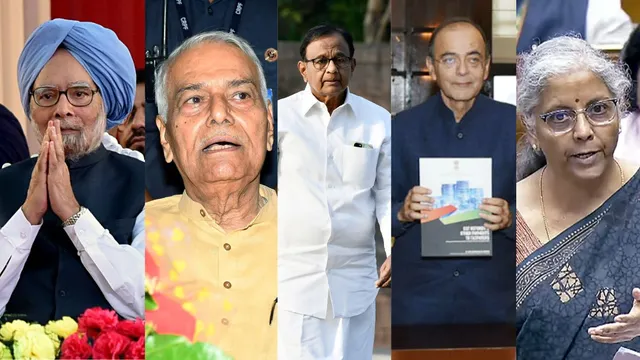- By Abhishek Sheoran
- Tue, 23 Jul 2024 11:13 AM (IST)
- Source:JND
Finance Minister Nirmala Sitharaman will today present the first budget of Modi 3.0 government. From middle-class people to the corporate sector, the expectations are really high. Talking about history, the first budget in India was presented in 1860, during the colonial era, by Scottish economist James Wilson. After independence, R K Shanmukham Chetty became the first Finance Minister in Jawaharlal Nehru’s government. He presented the first Union Budget of independent India on November 26, 1947.
Since then, more than 70 Union Budgets have been presented in the country. Among them, there were a few budgets which were proved to be milestones in India's economic history.
1991-92 Economic Liberalisation under Manmohan Singh:
The 1991 Union Budget, presented under P V Narasimha Rao government, is considered the architect of modern India. This budget was presented by bureaucrat-turned-politician Manmohan Singh. At that time, the country was grappling with a severe financial crisis, standing on the brink of bankruptcy. The then-Finance Minister Singh used his expertise as an economist to make significant reforms in the country's economy.
Manmohan Singh's budget reduced the customs duty on imported goods from 220 per cent to 150 per cent. This made Indian businesses more competitive on a global scale. He also initiated liberalisation, which involved reducing government intervention in trade and promoting economic freedom.
The ‘License Raj’ practice was also abolished in this period. Earlier, people were required to seek a permit from the government to start any business.
Chidambaram’s ‘Dream Budget’ In 1997:
P Chidambaram followed Manmohan Singh’s footprints to bring further liberalisation for businesses. He demonstrated economic and financial acumen when he presented the 1997 budget after becoming Finance Minister. This budget was labelled a 'dream budget' by experts. It included significant reductions in personal income tax and corporate tax rates. The highest personal income tax rate was reduced from 40 per cent to 30 per cent. This provided substantial relief to taxpayers and is considered one of the most notable budgets in Indian history.
Yashwant Sinha’s Landmark Budget For IT Sector In 2001:
Under the leadership of Atal Bihari Vajpayee, Yashwant Sinha laid the blueprint for the digital revolution. His budget, especially for the IT sector, was revolutionary. It reduced customs duties on 21 items, including computers. This led to a boom in the country's IT industry and established India as a hub for IT growth.
Union Budget and Railway Budget Amalgamated Under Arun Jaitley In 2016:
During the first term of Prime Minister Narendra Modi's government, late Arun Jaitley was the country’s finance minister. He made a historic change by merging the General Budget and the Railway Budget, ending a 92-year-old tradition. Arun Jaitley streamlined the process by combining both budgets into one, and since then, the Railway Budget has not been presented separately.
Nirmala Sitharaman Reduced Corporate Tax in 2019:
The incumbent Finance Minister Nirmala Sitharaman presented her first budget on July 5, 2019. Her first major economic reform was to reduce the corporate tax from 30 per cent to 22 per cent. The economy had taken a significant hit due to demonetisation and the implementation of GST. Reducing corporate tax helped the industrial sector recover substantially.

